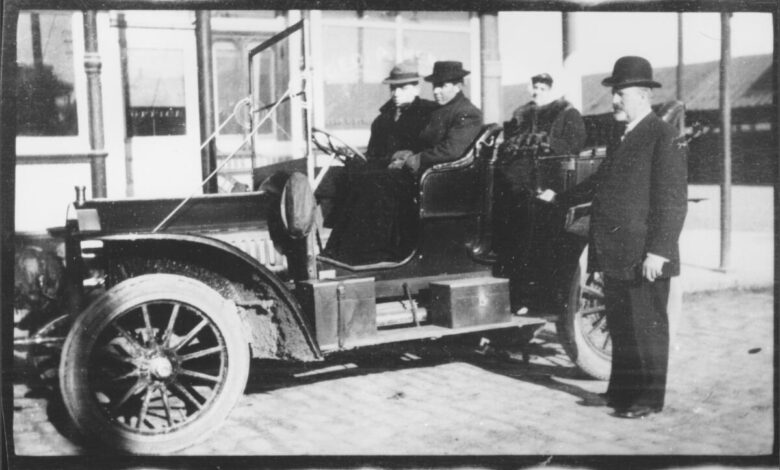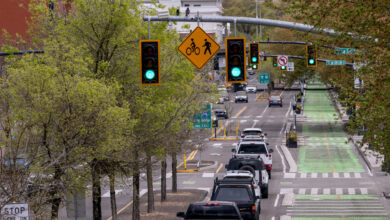Petaluma’s Past: The advent of the automobile in a changing world

A lot was happening in the world 112 years ago, in the year 1912. China was enmeshed in the violent upheaval of the Sun Yat-Sen revolution and U.S. Marines had just landed in Cuba, to quell what was believed to be a sugar plant uprising that would hurt U.S. interests, but was in reality a Cuban rebellion against Afro-Cubans.
That spring, the “unsinkable” Titanic hit an iceberg and did, indeed sink, resulting in over 1,500 deaths. Back in the U.S.A., Republican Teddy Roosevelt (who’d preceded William Randolph Taft but was eager to be president again), announced he would start a new party, dubbed the Progressive Party (and quickly nicknamed “The Bull Moose” party, after Roosevelt’s statement that he felt “strong as a bull moose). In the election that fall, however, our country went for neither Roosevelt nor Taft, electing Democrat Woodrow Wilson in a major sweep of 40 States.
Also in 1912, the State of Massachusetts became the first in the U.S. to establish a minimum wage law, set at $.30 cents an hour. ($8.75 today). Alaska became a U.S. territory that year, as the U.S. just was actively adding states. President Taft had made New Mexico and Arizona our 47th and 48th states.
In California, Paramount Pictures opened that year, while here in Petaluma, much was also ado about film. The Petaluma Daily Courier reported that, at the Hill Opera House, one could see, “For the first time in this city, motion pictures!” Those films were of the coronation of King George in England, and it was promised that “not only motion, but color is obtained!”
On Jan. 31, Petaluman John A. McNear Jr. announced the grand opening of the new Mystic Theater in his Father’s McNear Building on Main Street. Our then Mayor Zartman exclaimed that it was “The prettiest vaudeville house in California.” Mr. McNear was going to manage the theater himself and stated, “The house will book all of the good clean attractions and censored pictures.” The first act to be booked was Van & Livingston and their “nonsensical novelties.”
John McNear Sr., teamed-up with his other son, George Plummer McNear (better known as “G.P”), to become wildly successful in Northern California. Their many excellent endeavors are legend in Petaluma. However, within the month of January 1912, they made a fairly big miscalculation on the future, as John McNear announced he would begin construction of The American Livery Stable, predicting “This monster stable will have 100 stalls and four corrals and four whip and robe rooms.”
I have to wonder, in response to McNear going big on the continuing future of horses as our main mode of transportation, did no one mention, “Um, John, this ‘auto-mobile thing’ seems to be for real?”
At that time, Petaluma carriage and wagon maker William Farrell was quoted as saying, he “still had faith in the reliable steed, in spite of the auto-craze.”
Well, consider this.
In that same edition of the Petaluma Argus, it was announced that “The Winton Roadster, ordered by Robert Steitz, had arrived here on The Steamer Gold. It has all the latest improvements and is even equipped with a self-starting device.” Also arriving on Steamer Gold, that same day, was the “Elegant Stearns five-passenger auto, equipped with a silent engine.” And also in the motorized area, our Schluckbier Hardware Store on B Street was advertising the “Flanders 4 Motorcycle w/magneto,” for only $175 bucks!
It was pretty swell-looking too.
Our Petaluma fire laddies were lobbying the City Council to buy a “motorpropelled fire apparatus,” which, they said, was a “combined chemical, auto, pump and hose wagon.”
It seems that the move-away from the horse was definitely on here. However, if a bicycle better suited your needs, you could buy the “Rambler Bicycle w/wood rims, a gas lamp and big seat” for $50 bucks at G.M. Baker on 15 E. Washington. (Mr. McNear had one of those too.)
In a major push to become recognized that year, a new company named Pacific Gas and Electric, at 135 Main St, was advertising “Electricity for the farm and in the home!” and were demonstrating “appliances for various purposes.”
It was, indeed, a fast changing world. To show that they also weren’t behind the times, Petaluma’s Economy Store at 142 Kentucky, was advertising: “Rust-proof corsets” $1.50 each. (Rust-proof corsets?“) Meanwhile, in San Francisco, they were celebrating the mobilization of their first cable cars while over in Washington D.C., Mrs. William Howard Taft planted the capitol’s very first cherry tree. That was the start of a tradition, that still endures.
Names in the news of 1912 included Al Jolson, A.A. Milne, Ty Cobb, Mack Sennett, W.C. Handy, Agatha Christie, Sarah Bernhardt and Mary Pickford. (Sounds like a pretty wild party). The hit songs were “Alexander’s Ragtime Band” and “It’s a Long Long Way to Tipperary.” The Ziegfeld Follies was the hot musical on Broadway, and it was indeed “hot,” for those times.
In the world of local real estate, Petaluma’s J.W.Horn Company would sell you, according to newspapers of the time, “3 acres, in city limits, overlooking the valley, w/ nearly-new 4-room cottage with bath, patent toilet, hot and cold running water and ample poultry buildings. $3,500 w/ only $1,000 cash down.”
Of course you know I would comment here that that new “patent toilet” appeared to be a whiz of a modern feature! Compared to that, real estate doings today seem so, well, mundane ‒ and pricey too.
Skip Sommer’s “Petaluma Past” runs the first Friday of the month in the Argus-Courier. Sommer is an honorary lifetime member of the Petaluma Historical Museum and Heritage Homes, and the 1987 Petaluma Good Egg. You can reach him at skipsommer31@gmail.com.



